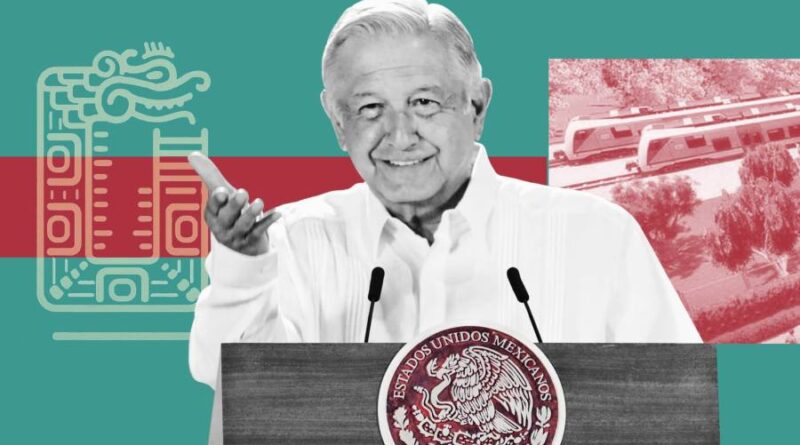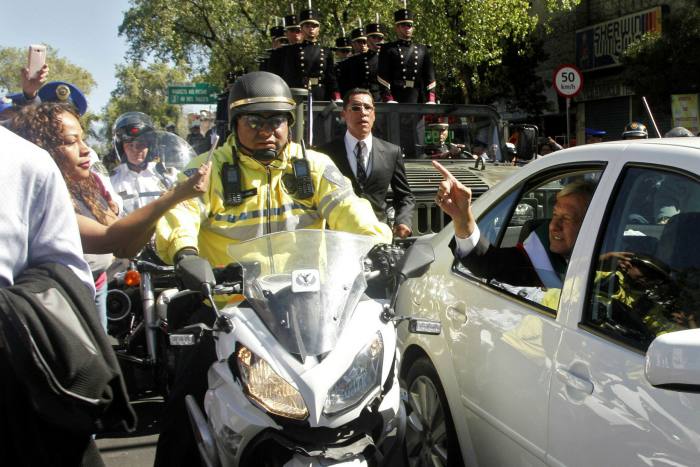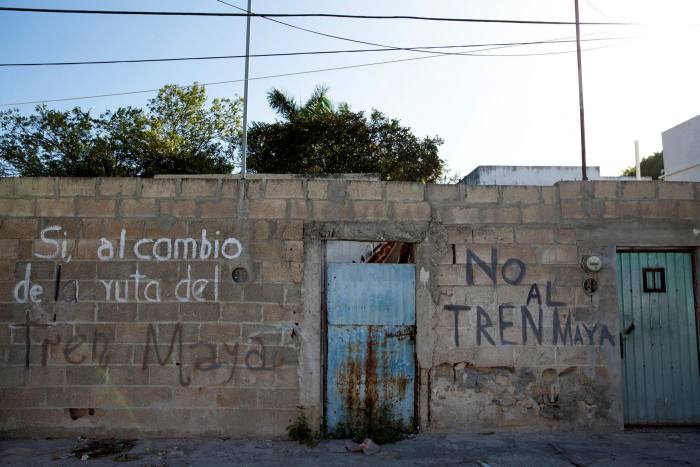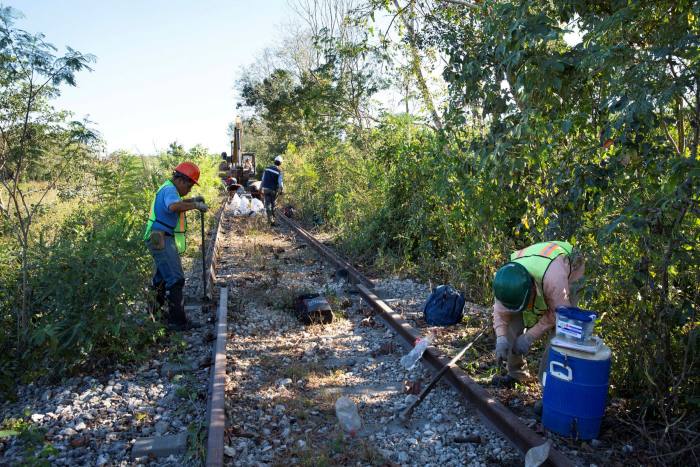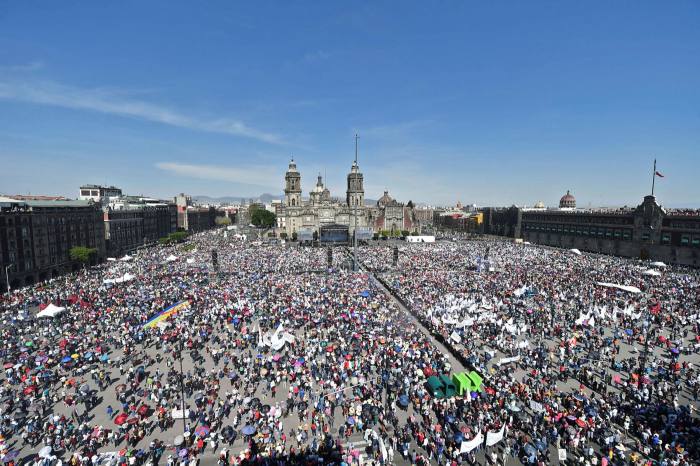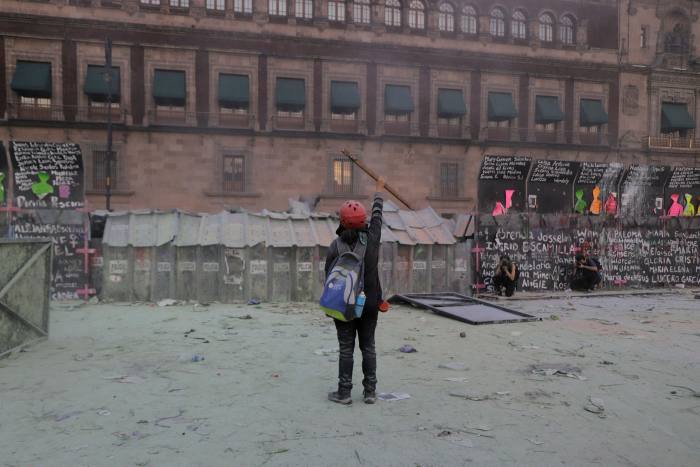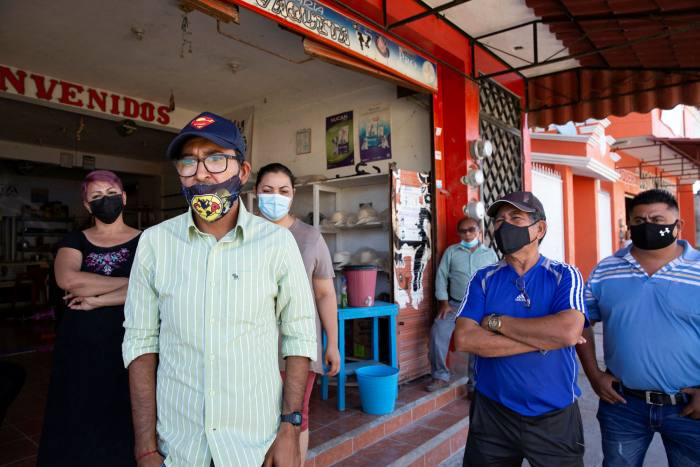‘In love with bad ideas’: López Obrador takes Mexico back to the future
Guadalupe Cáceres stands in her living room and points at the vintage tiles on the floor. Her family has lived for 127 years on this plot of land in Campeche, a colonial-era town on the Yucatán peninsula that still boasts ramparts erected after attacks by marauding Caribbean pirates. Now, a $7.8bn government rail project is set to rip through the middle of her single-storey blue-and-white painted home.
One of Mexican president Andrés Manuel López Obrador’s signature projects, the Maya Train aims to boost tourism and growth in the country’s poor south-east. Along with an $8bn oil refinery under construction in the neighbouring state of Tabasco, it symbolises his conviction that state-funded oil and train developments in left-behind areas are the way forward.
The populist leader won a landslide victory in 2018 when Mexicans, sickened by worsening corruption, spiralling violence and an economy that never grew fast enough to bring prosperity to the poor, gave him a mandate for revolutionary change. He promised a “profound and radical” transformation comparable to independence from Spain, and a government that would sweep away what he called the “calamity” of the free-market policies of the past four decades. And he pledged that growth in gross domestic product would be turbocharged to 6 per cent a year.
When he took power, arriving at his inauguration in a simple white Volkswagen and promising a no-frills administration, Mexicans knew that López Obrador, sometimes known by his initials Amlo, would be a very different leader from his near-regal predecessors. But one big question remained: would he govern as a pragmatic centrist, as he had done while mayor of Mexico City from 2000-05? Or would he return to his radical roots as a social activist from the 1970s?
Train to nowhere?
Cáceres knows all about revolutionary change. In 1938, her grandfather donated land to President Lázaro Cárdenas to lay the railway track that runs outside the front door of her house, its peeling facade now daubed with graffiti reading: “Change the route of the Maya Train”.
That was the year when Cárdenas, one of López Obrador’s heroes, expropriated foreign oil companies to create national oil champion Pemex. “They sold us the idea of modernity and more than 80 years on, they’re selling us the same idea,” says Cáceres, 64, a mother-of-three who has mobilised local opposition to the planned route. “If the train passes here, they’ll evict us, but I was born here and hope to die here.”
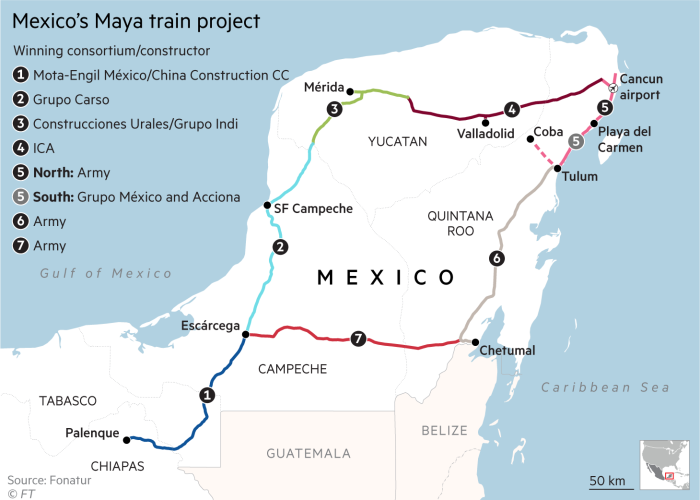
The Maya Train is scheduled to operate in a 1,550km loop around the Yucatán peninsula. Its investors include China Communications Construction Company, an infrastructure group that has been mired in controversy, and Mexico’s richest man, Carlos Slim. Work so far has consisted of ripping up old tracks, a powerful metaphor: López Obrador is tearing down the present to create a future inspired by the past.
“He’s like Rip Van Winkle,” says Enrique Krauze, a Mexican historian, referring to the fictional character who falls asleep for 20 years and reawakens to a vastly changed world. “He comes from the past and he is stuck in the past.”
López Obrador grew up in Tabasco as oil and industrialisation were transforming Mexico. He cut his teeth politically in the 1970s in the Institutional Revolutionary party (PRI), the authoritarian colossus that monopolised power after the Mexican revolution until the end of the 20th century and was dubbed the “perfect dictatorship” by Peruvian novelist Mario Vargas Llosa.
At that time, the country was still basking in the glow of state-led economic development and social programmes — a model which had powered the “Mexican miracle”, a decade and a half of nearly 7 per cent annual growth. A colossal oil discovery in the late 1970s promised to keep the boom alive but fiscal mismanagement and soaring borrowing — mistakes López Obrador does not want to repeat — plunged the economy into disastrous debt and currency crises.
By the end of the 1980s, Mexico had embarked on a different path and started opening up to foreign trade and investment. In 1994 it joined the OECD and signed the North American Free Trade Agreement with the US and Canada, a move which spawned thousands of factories in the north and centre of the country assembling everything from trucks to TVs.
Time has moved on for Mexico, but not for López Obrador: when he visited the high-tech central Bajío region in 2019, he chose not to go to a car factory powering the nation’s export-led economy but to a horse-drawn sugarcane mill. After taking power, he scrapped a partially-built new airport in the capital, put the presidential jet up for sale and shunned foreign travel.
“He has firmly oriented the Mexican economic ship towards the 20th century,” says Ernesto Revilla, head of Latin American economics at Citigroup and a former Mexican finance ministry official.
The diesel engines that will run on most of the route are anachronistic in a world hurtling towards electric power, say critics. López Obrador has rammed through a law favouring state-owned fossil fuel generation over renewable energy that contrasts with the plans of President Joe Biden to make the US — Mexico’s biggest trade partner — carbon-neutral by 2050. His oil refinery is being built at a time when global energy companies are competing to dump such assets amid excess supply.
The 67-year-old López Obrador “is perhaps the top exponent in Latin America of what I call ‘ideological necrophilia’ — a passionate attraction to ideas and ideologies which have been tried and tested, and failed, an infinite number of times in Mexico and Latin America,” says Moisés Naím, a fellow at the Carnegie Endowment for International Peace. “He is deeply in love with bad ideas.”

Falling short, but not responsible
His landslide victory was a triumph for an obstinate politician from the provinces with a folksy, man of the people style who promised to champion ordinary Mexicans because he was one of them.
On his long road to the presidency — it was his third attempt at winning power — López Obrador boasted of having visited every town in Mexico. He has astutely milked that grassroots understanding of everyday concerns, promising no hikes in taxes, petrol or electricity bills.
A master media performer, he instituted the “mañanera”, a daily morning news conference lasting up to three hours in which he sets the news agenda and excoriates critics as corrupt lackeys of the rich. Negative numbers are swatted away with the phrase “I have other data”.
“He strengthens his popularity with this bellicose narrative but that reduces the likelihood that his government and his proposals will have a happy ending because it stops the wealthy third of this country from participating in his project,” says Jorge Zepeda Patterson, founder of the news website Sinembargo.mx. “That’s a tragedy . . . it undermines his ability to build something.”
Despite criticism of his handling of the coronavirus pandemic, the spell López Obrador has cast over Mexico is holding. Lubricated by handouts — especially pensions and grants for young people, the elderly and farmers — López Obrador’s approval ratings remain a healthy 64 per cent, even as voters fault the government’s handling of the economy and crime. “He has fallen short in every area, even in fighting poverty and corruption,” says Lorena Becerra, a pollster. “And yet, there is this widespread notion that López Obrador is not responsible.”
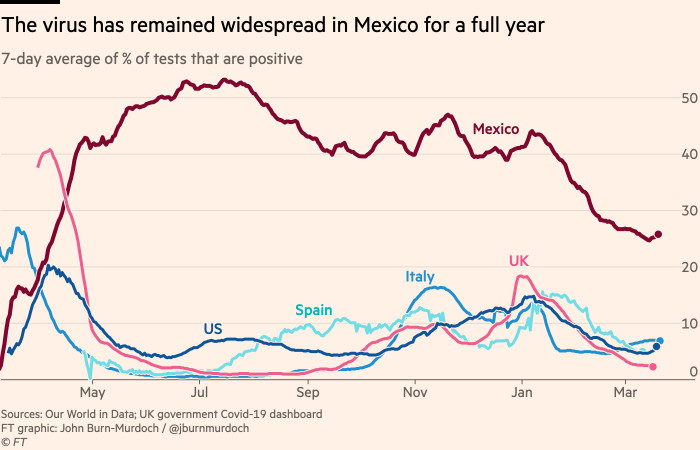
“I voted for the Pejito,” says Debbie Rodríguez, 33, a moto-taxi driver and shopkeeper in the rural community of La Chiquita, Campeche state, using a popular nickname for the president inspired by a local fish. She no longer receives any state aid and complains that work is scarce, but is loath to blame him. “I’m giving him the benefit of the doubt. He can’t change the country overnight.”
Supporters say he is to be applauded for trying a different tack. “I was a neoliberal. I worked with [Carlos] Salinas and [Ernesto] Zedillo,” says Patricia Armendáriz, a businesswoman close to López Obrador, referring to two of his 1990s predecessors. “But we failed . . . López Obrador is passionate about income distribution and fighting poverty and corruption, that’s why he has all my support.”
She adds: “I can’t tell you this is working yet, but I see things going in the right direction.”
Such high ratings are especially surprising given López Obrador’s disastrous handling of Covid-19. His laissez-faire approach has resulted in one of the worst human tolls of the pandemic worldwide. Official data showing Mexico approaching 200,000 deaths are widely considered to be three times under-reported and excess deaths last year were well above pandemic hotspots such as the UK, the US and Brazil, when adjusted for population size.
The pandemic has highlighted another of López Obrador’s quirks. Despite his leftist politics, the shopkeeper’s son is a fiscal conservative. With investors spooked by abrupt policy changes and the president’s penchant for taking decisions based on unlawful “people’s polls”, Latin America’s second-biggest economy was in recession even before Covid-19 struck. Yet almost uniquely in the developing world, López Obrador’s fiscal response to the pandemic was to tighten Mexico’s belt, saying Latin America’s second-biggest economy could not afford more debt.
Even though the G20 nation already had an untapped IMF credit line and plenty of room to borrow more, the government approved a Covid-19 stimulus package only fractionally bigger than Uganda’s as a percentage of GDP.
The result has been catastrophic: the UN’s Economic Commission for Latin America says poverty levels have leapt 9.1 percentage points to a near two-decades high of 50.6 per cent and official Mexican data show four out of 10 workers do not earn enough to buy basic food. López Obrador is relying on the United States-Mexico-Canada Agreement, the successor to Nafta, to keep investment and trade flowing. But the IMF believes it will take until 2026 for Mexico’s GDP, which contracted 8.5 per cent last year, to return to pre-pandemic levels.
“Average growth of GDP in the six-year [presidential term] is going to be close to zero and in terms of GDP per capita, it’s going to be negative,” says Citigroup’s Revilla. “The saddest part is that [this government] will end up hurting and impoverishing those it purports to represent.”
Sidelining the opposition
His record elsewhere is no less dismal, say critics. López Obrador has failed to reduce homicides — murders last year were just 0.34 per cent lower than their record level in 2019 — despite creating a new federal police force largely staffed and run by the military. At the same time, he has pressed the army, his chief ally, into the construction of state-run bank branches and parts of the Maya Train route — which once complete will belong to the army — as well as the conversion of a military airport into a civilian facility to replace the cancelled Mexico City project.
In one recent nationwide poll, 49 per cent thought he was doing badly on the economy and 54 per cent disapproved of his progress on public security.
López Obrador had promised to combat Mexico’s murderous drug cartels with “hugs not bullets”; true to his word, he called off a police operation to arrest the son of Mexico’s most notorious cartel boss in the northern city of Culiacán after cartel bosses flooded the streets with gunmen, saying he wanted to avoid bloodshed.
Indeed, when Mexico dropped an investigation into former defence minister Salvador Cienfuegos, after persuading the US to return him following his arrest in Los Angeles on drug-trafficking charges, and then accused the Americans of making up evidence against him, “it looked as though foreign policy was being dictated by the cartels”, Naím says. Cienfuegos denies the charges.
López Obrador has also picked a fight with women’s groups by refusing to criticise the choice of Félix Salgado Macedonio, an alleged serial rapist as his ruling Morena party’s candidate for a state governor race, despite rampant gender violence and some 11 femicides a day in Mexico. The president spent March 8, International Women’s Day, barricaded inside the presidential palace, protected from female protesters by 3m-high metal walls, while police blasted demonstrators with pepper spray.
But the president is already looking past controversy and Covid-19, promising life will be back to normal within months — just in time for midterm legislative elections on June 6, when he hopes to tighten his grip on the country. Opposition parties, still licking their wounds after being decimated in 2018 and demonised by the president ever since, are lagging 20 points behind the Morena party in the polls.
For many critics, López Obrador’s extreme centralisation of power, cultivation of an electoral base dependent on his government’s handouts and refusal to tolerate dissent means just one thing: “It’s nothing to do with the left-right ideology we like to impose on leaders,” says Shannon O’Neil, a senior fellow at the Council on Foreign Relations in New York. “He is rebuilding those pillars of the 1970s PRI.”
With 500 seats in the lower house and 15 governorships up for grabs in June, “the midterms really matter”, she adds. López Obrador commands majorities in both houses of congress; if he can maintain or extend those, “it will be very hard to hold back the installation of an authoritarian political system”.
In the end, his unlikely obsession with fiscal prudence, a throwback to past crises, might reduce the risk of Mexico going off the rails like Venezuela — the example most often cited of a wealthy Latin American country descending into chaos. But it could be a bumpy ride.
“Amlo isn’t taking us in the right direction,” says Cristopher Herrera Sarmiento, a vet in the town of Escárcega, whose family business lies in the path of the Maya Train. “For me, a train doesn’t spell development.”

